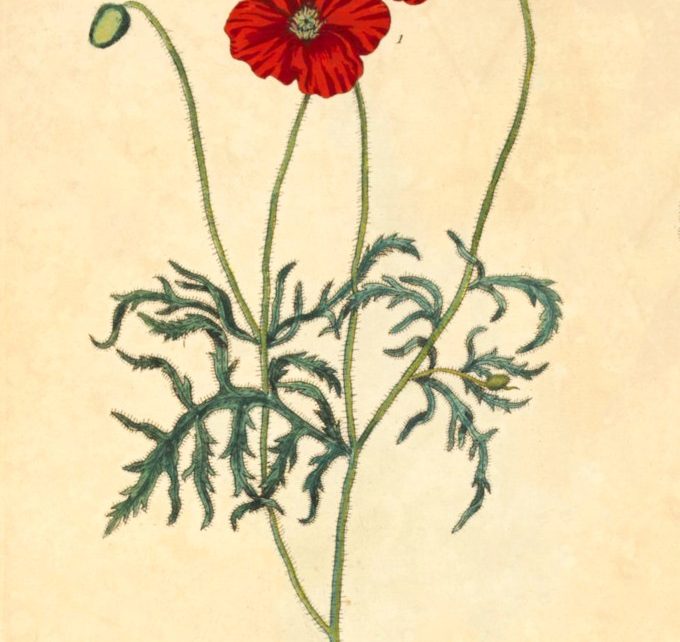“Can you plant a garden to stop a war? It depends how you think about time. It depends what you think a seed does, if it’s tossed into fertile soil.”
“The gardener digs in another time, without past or future, beginning or end… Here is the Amen beyond the prayer,” Derek Jarman wrote as he grieved his dying friends, faced his own death, and contemplated art, mortality, and resistance while planting a garden between an old lighthouse and a new nuclear plant on a barren shingled shore.
Jarman is one of the artists whom Olivia Laing profiles and celebrates in Funny Weather: Art in an Emergency (public library) — her superb collection of meditations on art, activism, and our search for meaning, drawing on the lives of artists whose vision has changed the way we see the world, ourselves, and others.

Laing’s Jarman-fomented essay, titled “Paradise,” begins with the question of whether gardening is a form of art and ends with the question of whether art is a form of resistance — a necessary tool for building the Garden of Eden we imagine a flourishing society to be.
She writes:
Gardening situates you in a different kind of time, the antithesis of the agitating present of social media. Time becomes circular, not chronological; minutes stretch into hours; some actions don’t bear fruit for decades. The gardener is not immune to attrition and loss, but is daily confronted by the ongoing good news of fecundity. A peony returns, alien pink shoots thrusting from bare soil. The fennel self-seeds; there is an abundance of cosmos out of nowhere.
To bridge Laing’s two questions, one must somehow reconcile these two temporal models: linear time, which the Greek called chronos and along which we plot the vector of progress, and cyclical time, or kairos, which is the time of gardens and, Laing intimates, the time of societies. We long for the assurance of steady progression, yet all around us the rest of nature churns in cycles. How do the cicadas know when to awake from their seventeen-year slumbers and rise up by the billions to make new life that will in turn repeat the cycle? And the migratory birds, “how can they know that it’s time to go?,” as Nina Simone asked in her serenade to time — Nina Simone, who also chose to cover Pete Seeger’s “Turn! Turn! Turn! (To Everything There Is a Season)” and who gave all she had to a movement the central concerns of which have returned a life-season later with redoubled urgency, its fruits only just beginning to ripen in our lifetime.
Therein lies the paradox — how do we practice resistance if time is the substance we are made of, as Borges so timelessly observed, and yet we live suspended between these two parallel versions of time as we try to build paradise?

“Resistance” has always been a funny word to me — one without direct translation in my native Bulgarian, in this particular context of constructive social change. It contours something necessary but not sufficient — while ennobling and empowering in its implication of defying wrongness, it limits its own power by ending at what is to be eradicated, without indication of what is to be grown in its place and how. In this respect, the resistance approach to human nature (and the consensual collective byproduct of human natures we call society) is like the pesticide approach to nature.
“Resistance” is a word especially limited by the elemental fact that there are certain things simply beyond the reach of resistance, impervious to our passions and protestations — spacetime, gravity, the fundamental laws that gave rise to our existence and will eventually return us to the stardust of which we are made. Your face will sag and your spine will bend under the twin assault of gravity and time, and so will mine, until our atoms disband altogether to become food for the worm and fertilizer for the mycelial wonderland from which bluebells will rise some future spring.
None of this we can resist.
But maybe — and that is what redeems and consecrates our finite human lives and our limited powers — within those parameters, there is space enough and spirit enough to resist what is poisonous to the ideological soil we call culture and persist in planting, for as long as we have to live and with as much generosity as we have to give, something lush and beautiful. That we might never live to see it bloom might just be okay. To have planted the seeds is satisfaction enough worth living for.

Laing lands in a kindred place. A century and a half after Thoreau contemplated the long cycles of social change and an increment after Zadie Smith reminded us that “progress is never permanent, will always be threatened, must be redoubled, restated and reimagined if it is to survive,” Laing writes after a pilgrimage to Derek Jarman’s grave:
Is art resistance? Can you plant a garden to stop a war? It depends how you think about time. It depends what you think a seed does, if it’s tossed into fertile soil. But it seems to me that whatever else you do, it’s worth tending to paradise, however you define it and wherever it arises.
The arc of the moral universe might not be so different from that of the stem bent with bluebells tolling their vernal reminder that change comes in cycles. Every arc, after all, is but a segment of a circle. What it takes to draw our share of it with a steady hand as we try “widening our circles of compassion” without the assurance of immediate results — that is the question we each answer with our lives.
Poet and gardener Ross Gay comes closest to my own answer in his life-tested conviction that time spent gardening is “an exercise in supreme attentiveness.” As I roll in my palm six large seedpods of sea kale — a neglected flowering wonder I discovered on the pages of Derek Jarman’s journal — and thumb them into the moist Brooklyn soil where they may or may not sprout, I find more and more that attention is the elemental unit of time. Each moment we are fully paying attention is an atom of eternity. The quality of our attention measures the quantity of our aliveness — our sole generator of resistance and persistence.
This I know to be true: What will survive of us are shoreless seeds and stardust.

Complement with the poetic neurologist Oliver Sacks on the healing power of gardens, then revisit Laing on life, loss, and the wisdom of rivers.
donating = loving
For 15 years, I have been spending hundreds of hours and thousands of dollars each month to keep Brain Pickings going. It has remained free and ad-free and alive thanks to patronage from readers. I have no staff, no interns, no assistant — a thoroughly one-woman labor of love that is also my life and my livelihood. If this labor makes your life more livable in any way, please consider aiding its sustenance with donation.
newsletter
Brain Pickings has a free weekly newsletter. It comes out on Sundays and offers the week’s most inspiring reading. Here’s what to expect. Like? Sign up.





